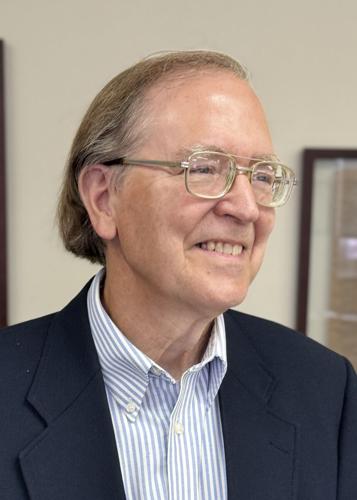Jerry Cleworth is running for reelection to Fairbanks City Council Seat A.
Cleworth has lived in Alaska for 72 years. He moved to Fairbanks when his father became the pastor of First Presbyterian Church. He attended the University of Alaska Fairbanks, where he received a bachelor’s degree in business. He was an accountant for 10 years before opening Alaska Rare Coins in 1980.
Cleworth has served for more than 27 years as a council member and three years as city mayor. He got involved in local politics in the late eighties when the economic situation in Fairbanks was “changing rapidly,” he said. He helped establish the city’s permanent fund in 1997, which has contributed more than $120 million to the city’s general fund, and has helped keep Fairbanks debt free since he was mayor.
Cleworth said that he has concerns about the city’s financial situation, and would continue to operate under a balanced budget to remain competitive while living within the limits of the city’s charter and help come up with solutions to address financial issues the city faces.
He serves on the FAST Planning policy committee and has served on the Fairbanks Development Authority, the City of Fairbanks finance Committee, and the Greater Fairbanks Chamber of Commerce.
Cleworth has been married for 52 years to Janice. They have two daughters and five grandchildren. He enjoys reading, listening to music and playing guitar and keyboard.
How can the city better diversify its revenue streams? How do you feel about heavily relying on the city’s permanent fund?
One of the city’s strengths is the diversity of the revenue stream developed over the years. The 2024 budget consists of $47,532,563 in total revenues. $11,600,000 comes from alcohol, tobacco, marijuana, and gasoline sales taxes. $9,012,260 comes from licenses, permits and charges for services. Property taxes make up about 34% of our budget and bring in $16,155,026 while the permanent fund contributes $5,679,938. The balance of $5,085,339 comes from other sources. Residents often believe that property taxpayers make up the majority of our total revenues, but in reality the percentage of our budget dependent upon property taxes has been shrinking.
The permanent fund was established for one purpose: to help fund the city’s budget from year to year so that we are less dependent upon fees and taxes. Since inception, it has contributed more than $125 million dollars over 27 years.
How do you keep the city competitive?
Overall, our community has remained competitive in many areas. Fourteen years ago we became alarmed by proposals to “warm base” Eielson and move resources to Anchorage. Our community banded together and we were able to reverse this plus house the new F-35’s along with their support personnel. Fairbanks is a freight hub for northern Alaska and this will only continue to expand. Mining is growing and creating many good paying jobs for families as gold prices escalate. Tourism has greatly expanded into the winter months making us a year round destination point and the university continues to be a vital part of our economy.
Our city government can help by providing dependable public works and safety services and by keeping taxes as stable as possible so new businesses and homeowners can plan with a great degree of accuracy what their tax burden will be for years to come.
What is your plan to bring the Emergency Service Patrol (ESP) back?
Originally, the Emergency Service Patrol was funded from grants and initiated by organizations outside of the city’s purview. Eventually, the Downtown Association spearheaded the effort to retain this service with contributions from both the private sector and the city. Currently, costs for continuing the service have risen so rapidly that the administration is looking for options which should be considered. One proposal would bring the program in-house under the Police Department with a public safety assistant (PSA) to shepherd the program. Another option is the possible use of Golden Heart Parking (GHP) to oversee the program. They already work with the ESP in housing their equipment and allow them use of their facilities. Years ago, the downtown Clean Team was overseen by GHP until funding ran out. Finally, we may look at a new request for proposals with certain parameters and for additional grant sources that may be available.
With abatement, no emergency service patrol and no warming shelter facility, how should the city address the populations that are displaced from the cities abatement policy?
The abatement ordinance simply adopted a new process for determining hazardous and abandoned properties and lays out a procedure to work with owners to address the problems they may have encountered. The city conducts very few abatements each year, and hopefully the new ordinance will reduce this even further. I am unaware of any individual who has been displaced because of an abatement.
The city hosts the Housing, Crisis Now, and Reentry Coordinators in the Mayor’s office. These employees put a great deal of effort in helping to find solutions for individuals who are in need and identify resources currently available. They also work with all organizations that focus on the homeless and aid in trying to locate a new warming shelter.
What would you do to strengthen the relationship between the borough, city and school district?
Several years ago, the borough decided that the two cities should no longer act as a Board of Adjustment (BOA) for the Planning Commission. Despite much information provided by Fairbanks Public Works officials, engineers and council members showing why it imperative to use the city as the BOA for issues within the city, the borough assembly voted to end decades of tradition. Last year, assembly members Lojewski, Rotermund, Wilson, Cash, and Haney voted to restore the old system for which the city is very thankful. This was the first major step toward improving relations. I would also like to see the borough assembly repeal their ordinance number 2022-46 which greatly limited the roles of the city and school board representatives at borough assembly meetings and restore the original rights that these representatives traditionally held.
What do you think the city should be doing with the Polaris site after it is torn down?
The city should be open to all ideas and initiate a request for proposals when the time comes. That is the procedure followed when the city took over the Fairbanks Development Authority properties years ago after that organization was disbanded. It is very important that the process be totally transparent and that existing property owners on that block be involved in the decisions that we will have to make. Currently, much of the discussion has been focused around retail and/or housing, both of which would be a draw for downtown, but I also believe that the council members should be receptive to all viable options.


